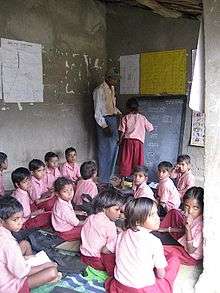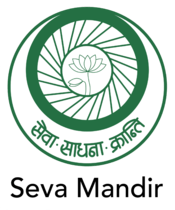Seva Mandir
Seva Mandir (lit. trans. 'Temple of Service') is a grassroots NGO based in Udaipur, in the Rajasthan state of India. Founded by Dr. Mohan Sinha Mehta in 1968.[1] The organisation turned 50 in 2018[2] and it is currently headed by Chief Executive, Ronak Shah. Seva Mandir works mainly in natural resource development and sustainability,[3] village development, women empowerment[4], education[5] and health care, continuing education, and children's welfare.[6][7][8][9]

 | |
| Motto | Seva, Sadhna, Kranti |
|---|---|
| Formation | 1968 |
| Type | Not for profit |
| Purpose | Natural Resource Development, Rural Development, Peri-Urban Development, Women's Empowerment, Primary Education, Early Childcare and Development, Youth Development, Democratic Development |
| Headquarters | India |
| Location |
|
Region served | Udaipur and Rajsamand Districts, Rajasthan |
Chief Executive | Ronak Shah |
Staff | 400+ |
| Website | Seva Mandir |
History
Dr. Mohan Sinha Mehta (a distinguished Indian ambassador and civil servant) founded Seva Mandir in 1968. Initially, the focus of the organisation was to provide Adult Education, ensuring that they had the tools and knowledge to become leaders of their own development.[11]
Between 1973-1976, an extreme drought in Udaipur district led Seva Mandir to expand its focus to encompass relief and agriculture extension services.[12] Eventually, the organisation moved to work on empowerment and primary education as well.
Current activities
Natural resources
Seva Mandir develops water harvesting systems to increase the availability of water for agriculture and clean drinking water for communities[13]. Furthermore, the organisation works on regenerating common land. The majority of the rural and tribal communities depend on the common land for their survival.[14] More than 120 million trees have been planted in an effort to combat climate change.[15]
Women's empowerment
Seva Mandir run Self-Help Groups[16], Women's Resource Centres and a shelter home for women who have faced physical and/or mental abuse.[17][18]
Primary education
Seva Mandir runs over 140 Shiksha Kendra (bridge schools) in remote rural areas. Shiksha Kendras use an activity-based learning method to teach perviously out-of-school children aged between 6-14 years old. A Residential Learning Camp is also run for the same age range.[19][20][21]
Youth
Youth Resource Centres are run to connect often left-behind adolescent boys and girls with vocational, life and social skills trainings. A football initiative is used to link the young people in rural and tribal communities with the resource centres.[22][23]
Peri-urban
Seva Mandir works in 2 peri-urban areas; Delwara and Kelwara, the latter or which is near Kumbhalgarh fort. The organisation works on issues of governance, water availability, waste management, and heritage restoration.[24][25][26] A community and heritage walk is also run in Delwara for tourists.[27]
Community institutions
Seva Mandir creates and facilitates Community Institutions in rural and tribal communities. It is mandated that these institutions are democratically elected and have an equal representation of men, women, and children. Their aim is to take responsibility for their own development and sustain projects after Seva Mandir steps back.[28][29]
Notable associations
| Wikimedia Commons has media related to Seva Mandir Gallery. |
Seva Mandir's research association with Nobel Prize winners Abhijit Banerjee, Esther Duflo and Michael Kremer began in 1996 and set out to improve the health and educational status of remote rural and tribal communities of Udaipur and Rajsamand districts.[30][31][32][33] The research studies contributed to the global discourse on the alleviation of poverty. Banerjee and Duflo discussed the results of their research with Seva Mandir and other organisations globally in their book Poor Economics: A Radical Rethinking of the Way to Fight Global Poverty.
References
- Franda, Marcus (1979). India's rural development : an assessment of alternatives. Indiana University Press.
- Seva, Mandir. "Seva Mandir 2017-2018 Annual Report" (PDF). Seva Mandir Annual Report: 11.
- "Archived copy". Archived from the original on 5 April 2009. Retrieved 10 August 2009.CS1 maint: archived copy as title (link)
- "CSR : Colgate & Seva Mandir launch Women Empowerment Program and inaugurate an anicut in Alsigarh". India CSR. 30 November 2018. Retrieved 31 January 2020.
- "Pushing evidence-based policymaking for the poor". Live Mint. 16 October 2017. Retrieved 31 January 2020.
- "Seva Mandir". Poverty Action. Innovations for Poverty Action.
- "Marking 50 years of Seva Mandir's Existence and Creating a Vision - Aapno Melo". Business Wire India. Business Wire India.
- "Seva Mandir". Poverty Action Lab. Abdul Latif Jameel Poverty Action Lan.
- Mehra, Mrinalini Patwardhan. The Republic of My Dreams: The Seva Mandir Story: 1968 - 2018 (First ed.). Harper Collins.
- Photo courtesy of GiveWell.
- "History | Seva Mandir". sevamandir.org. Retrieved 17 March 2020.
- Desai, Raj; Olofsgård, Anders. "Local Governance and Community Empowerment". Georgetown University.
- "Seva Mandir partners with L&T for Community Development". Udaipur Times.
- "Common Land & Poor Livestock Keepers Experiences from Common Land Development in the States of Rajasthan & Madhya Pradesh in India" (PDF). www.fes.org. FES.
- "Conservation of Common Lands". Seva Mandir. Seva Mandir.
- Democratic Transformation and the Vernacular Public Arena in India. Routledge. 11 July 2014. p. 68. ISBN 978-0-415-73867-5.
- "A Short Stay Home". 2hundredrupees.
- "Want to Support Women? Here's How You Can Do It Over a Weekend in Udaipur!". The Better India. September 2017. Retrieved 31 January 2020.
- "Abhijit Banerjee: Focus on weakest pupil". The Telegraph. The Telegraph India.
- "Pre-School, Play, A Plate of Food: Transforming Tribal Kids In 60 Days". The Better India. The Better India.
- "Corporate Social Responsibility". India Shelter. India Shelter.
- "Zinc Football Youth Tournament kicks-off in grand style, DAV HZL Zawar Mines (Boys) and Lucky Football Club (Girls) emerge Champions of Udaipur Zone". Udaipur Kiran. Udaipur Kiran.
- "Football youth tournament begins in Udaipur, teams from 33 districts will participate". Zee News. Zee News Hindi.
- "InterGlobe Foundation initiates Heritage Restoration and Waste Management In Rajasthan". APN News. APN News.
- "InterGlobe Foundation restoring a 19th century water structure". The CSR Journal. The CSR Journal.
- "How corporates, civil society can play key roles in preserving heritage". Financial Express. Financial Express.
- "Delwara: A heritage walk by Seva Mandir in Rajasthan". Backpack Adventures. Backpack Adventures.
- Sahoo, Sarbeswar (2014). "Review: Civil Society and Democratization in India: Institutions, Ideologies and Interests". Asian Journal of Social Science. 42 (6). JSTOR 43495842.
- Shreya Ray (21 October 2011). "Seva Mandir | Enabling People to Participate". Live Mint.
- Pradeep Kumar (28 October 2019). "अभिजीत बनर्जी - एस्थर डूफ़ेलो को नोबेल दिलाने का उदयपुर कनेक्शन- ग्राउंड रिपोर्ट" [Abhijeet Banerjee - Udaipur Connection to get Esther Duffalo Nobel - Ground Report]. BBC News Hindi (in Hindi). Retrieved 28 October 2019.
- "How Banerjee and Duflo's partners in India view their experiments". The Times of India. Retrieved 22 October 2019.
- "Esther Duflo: It pays to care about the poor". The Hindu. Retrieved 1 November 2019.
- "Mindspark In Rajasthan: Personalized Adaptive Learning Tools To Improve Learning Outcomes". Business World.